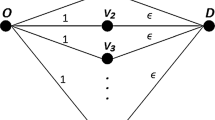Abstract
We consider the online k-Canadian Traveler Problem (k-CTP) which is defined on an undirected graph with a given source node O and a destination node D. Non-negative edge costs are given. The traveling agent is initially at O. There are k blocked edges in the graph, but these edges are not known to the agent. A blocked edge is learned when the agent arrives at one of its end-nodes. The goal of the agent is to arrive at D with minimum total cost. We consider the k-CTP on graphs that consist of only node-disjoint O–D paths, where it was shown that there is no randomized online strategy with competitive ratio better than \(k+1\). An optimal randomized online strategy was also given. However, we prove that the given strategy cannot be implemented in some cases. We also modify the given strategy such that it can be implemented in all cases and meets the lower bound of \(k+1\).
Similar content being viewed by others
References
Bar-Noy A, Schieber B (1991) The Canadian traveler problem. SODA ’91 Proceedings of the second annual ACM-SIAM symposium on discrete algorithms, pages 261–270
Bender M, Westphal S (2015) An optimal randomized online algorithm for the k-Canadian traveller problem on node-disjoint paths. J Comb Optim 30:87–96
Demaine ED, Huang Y, Liao C-S, Sadakane K (2014) Canadians should travel randomly. Int Colloq Automat Lang Program 8572:380–391
Liao C-S, Huang Y (2015) Generalized Canadian traveller problems. J Comb Optim 29:701–712
Papadimitriou C, Yannakakis M (1991) Shortest paths without a map. Theor Comput Sci 84:127–150
Shiri D, Salman S (2017) On the online multi-agent o-d k-Canadian traveler problem. J Comb Optim 34:453–461
Shiri D, Salman S (2018) Competitive analysis of randomized online strategies for the online multi-agent \(k\)-Canadian traveler problem. J Comb Optim 1:1–18. https://doi.org/10.1007/s1087
Sleator D, Tarjan R (1985) Amortized efficiency of list update and paging rules. Commun ACM 28:202–208
Westphal S (2008) A note on the k-Canadian traveler problem. Inf Process Lett 106:87–89
Xu Y, Hu M, Su B, Zhu B (2009) The Canadian traveller problem and its competitive analysis. J Comb Optim 18:195–205
Zhang H, Xu Y, Qin L (2013) The k-Canadian travelers problem with communication. J Comb Optim 26:251–265
Author information
Authors and Affiliations
Corresponding author
Additional information
Publisher's Note
Springer Nature remains neutral with regard to jurisdictional claims in published maps and institutional affiliations.
Rights and permissions
About this article
Cite this article
Shiri, D., Salman, F.S. On the randomized online strategies for the k-Canadian traveler problem. J Comb Optim 38, 254–267 (2019). https://doi.org/10.1007/s10878-019-00378-1
Published:
Issue Date:
DOI: https://doi.org/10.1007/s10878-019-00378-1




